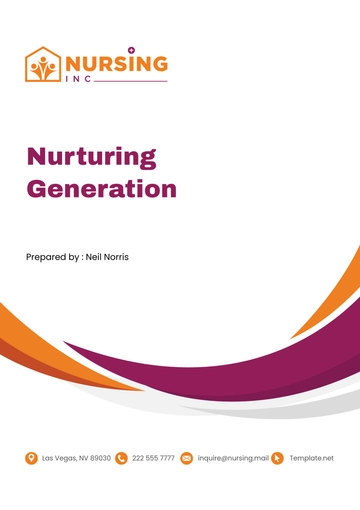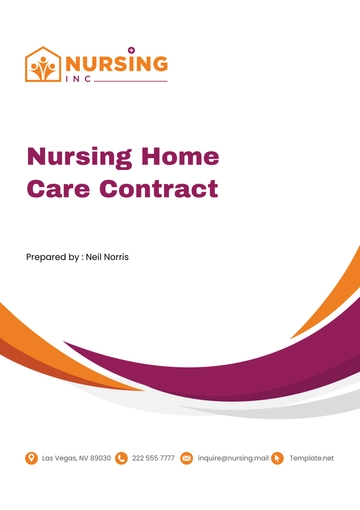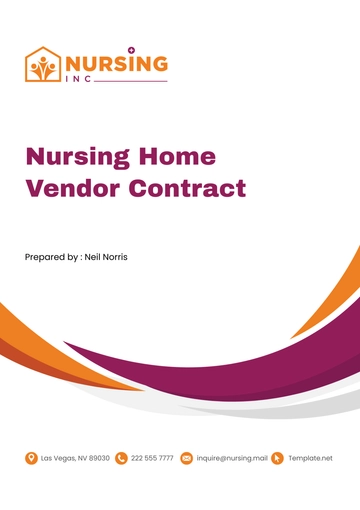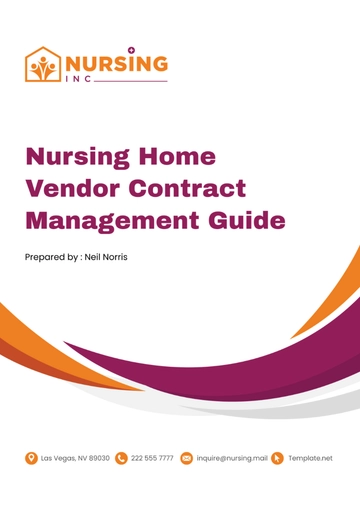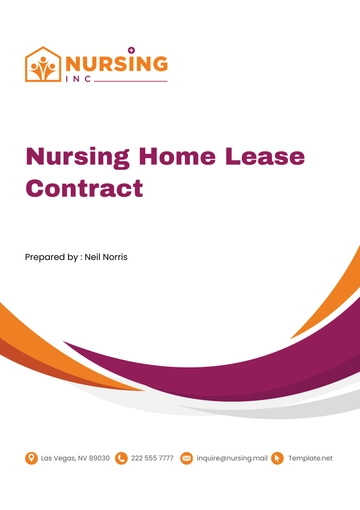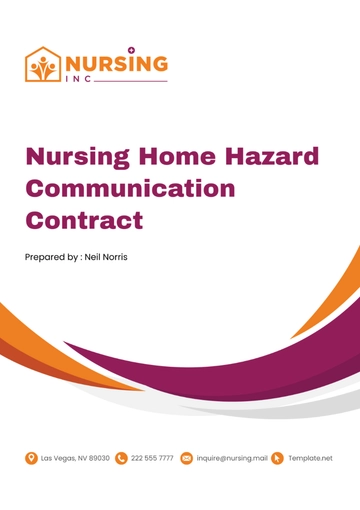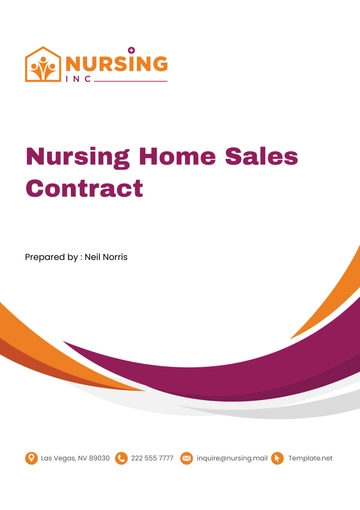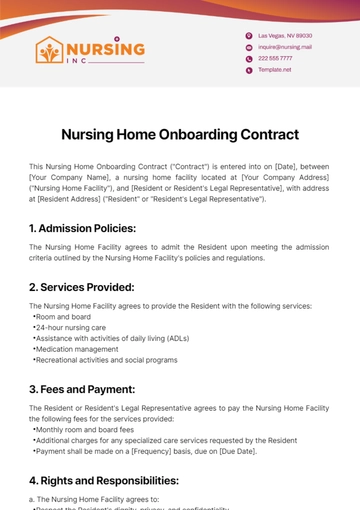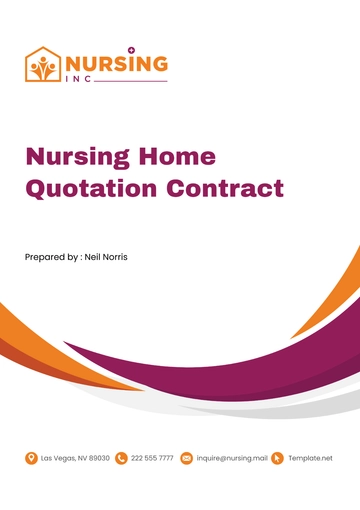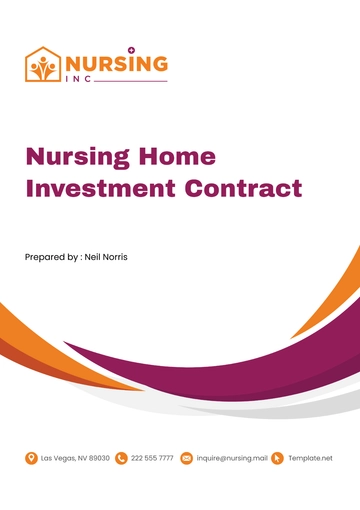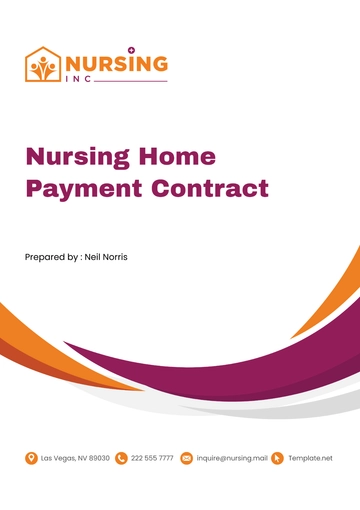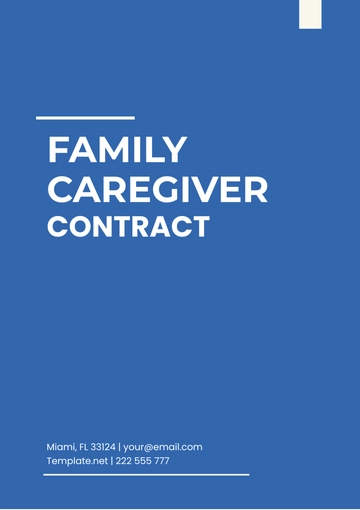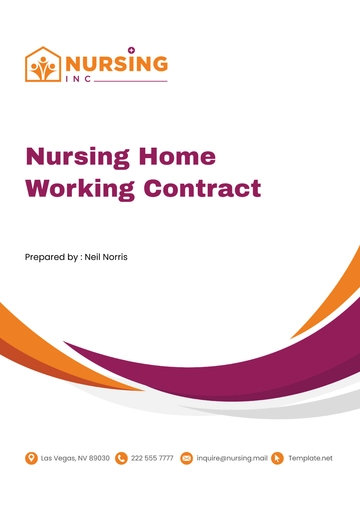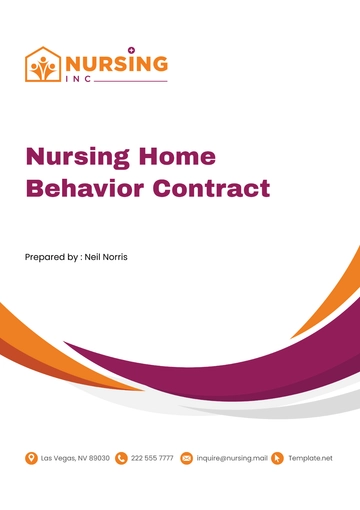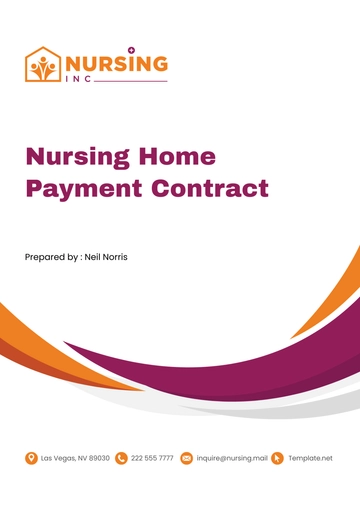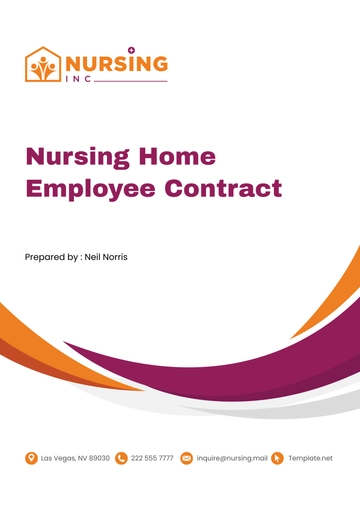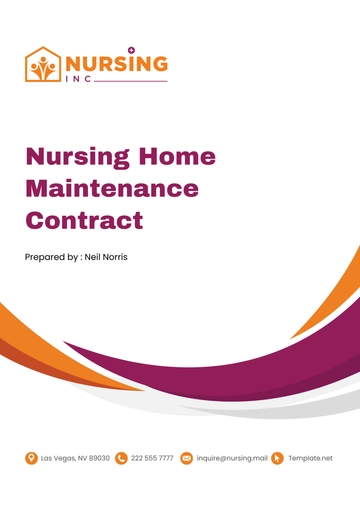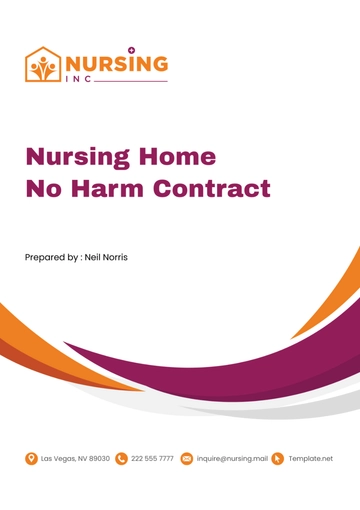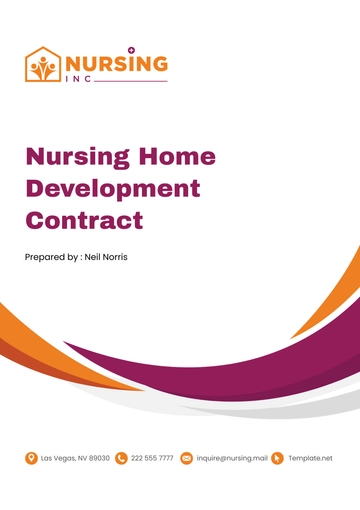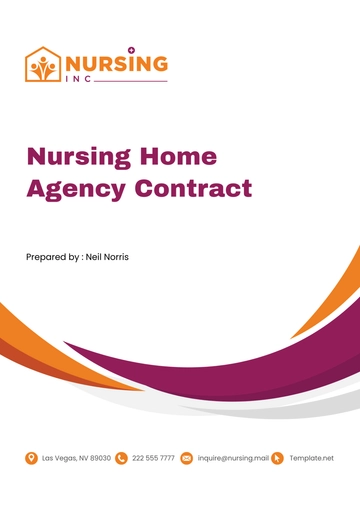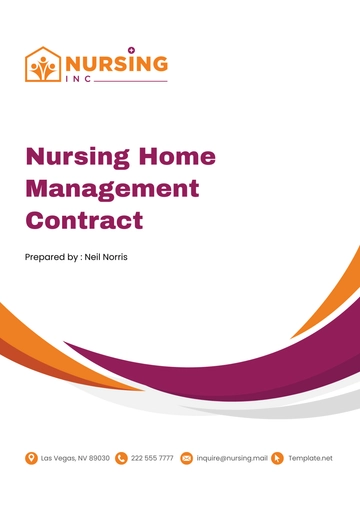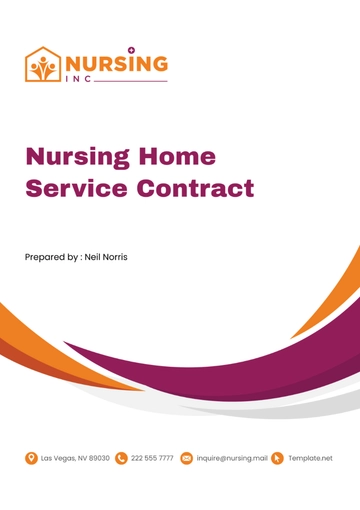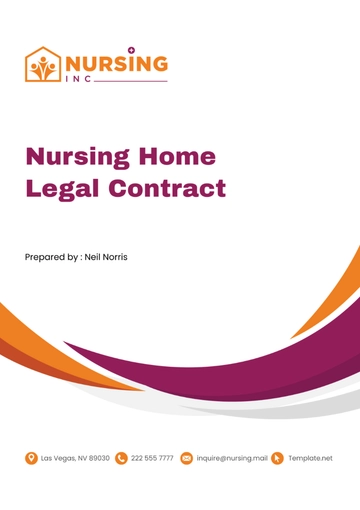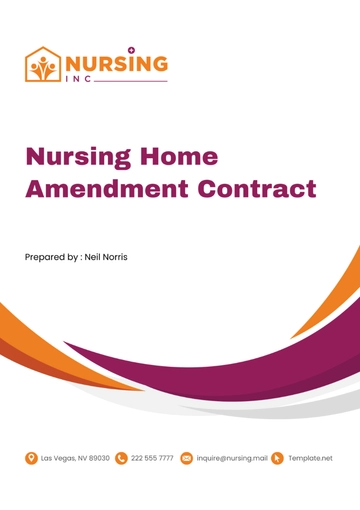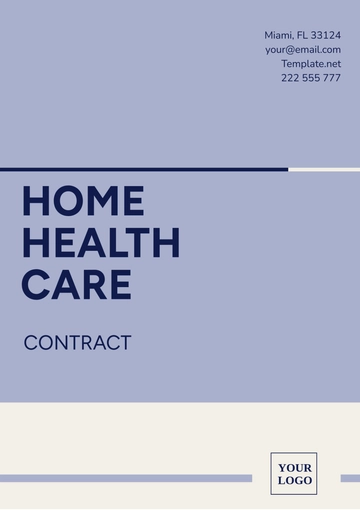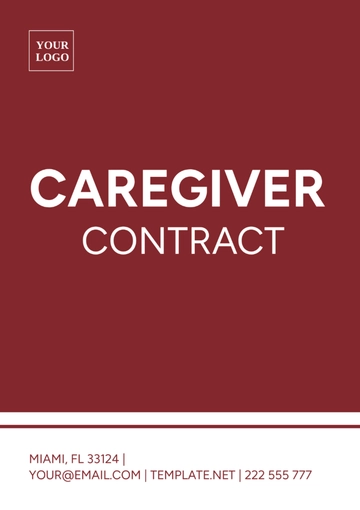Free Nursing Home Agency Contract
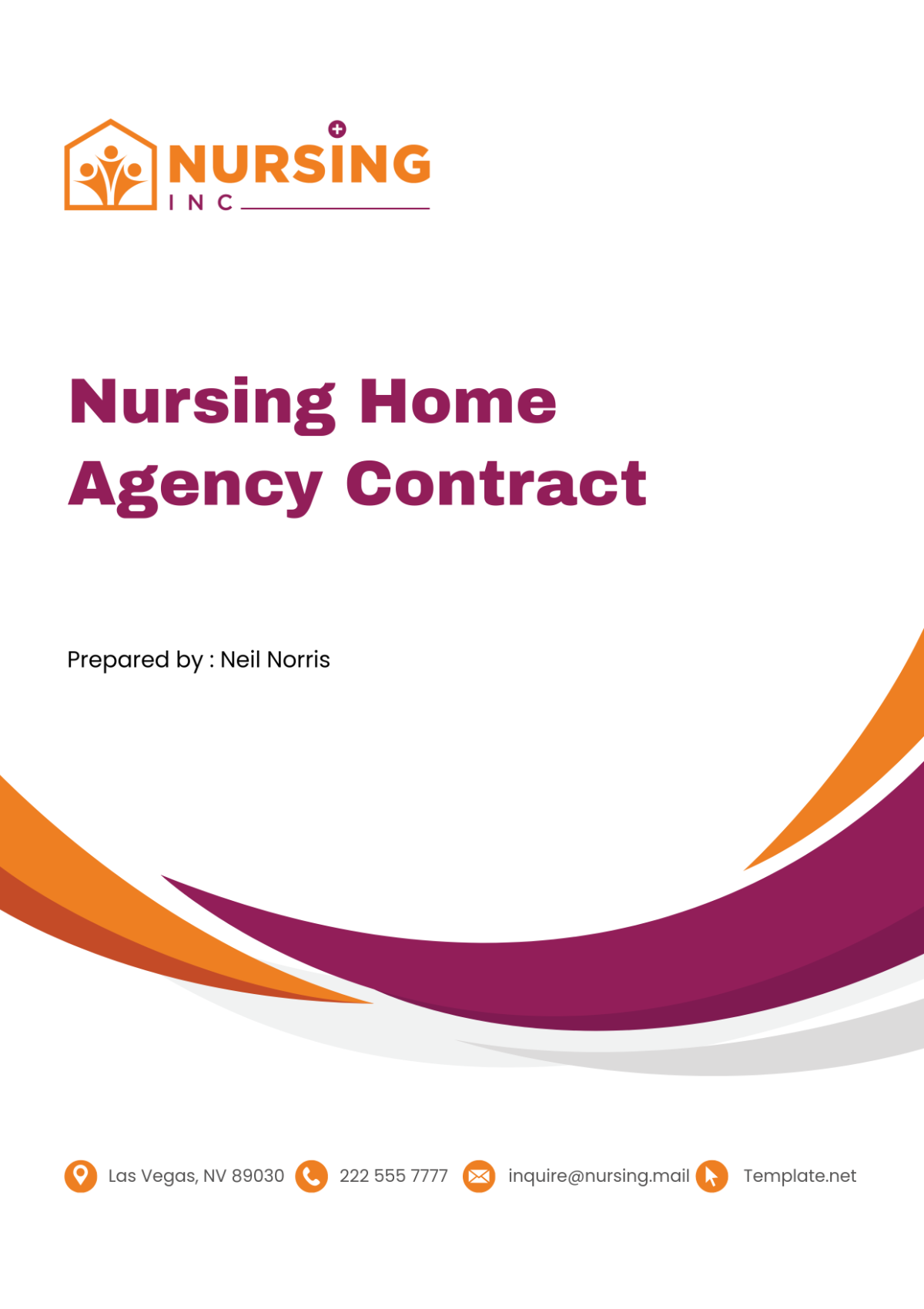
I. Introduction
A. Purpose of the Contract
This Contract serves to establish a formal partnership between the Nursing Home and the Agency, facilitating the seamless provision of healthcare services to residents. By delineating the roles, responsibilities, and expectations of both parties, this agreement aims to ensure the highest standards of care delivery and resident satisfaction.
B. Parties Involved
The Nursing Home, a reputable [Type of Facility], is committed to providing compassionate and comprehensive care to its residents. The Agency, with its expertise in healthcare staffing and services, brings valuable resources and support to enhance the Nursing Home's capacity to meet the diverse needs of its residents.
C. Effective Date
This Contract shall come into effect on [Date], marking the official commencement of the partnership between the Nursing Home and the Agency. From this date forward, both parties shall be bound by the terms and conditions outlined herein, working collaboratively to achieve mutual goals and objectives.
II. Definitions
A. Effective Date
The term "Effective Date," as used in the contract, is a reference to the specific date upon which this contractual agreement assumes a legally binding and enforceable status after all conditions have been met and signatories have given their binding commitment; the exact details of this date, including when it falls, are outlined and specified within Section I of this contract.
B. Services
The term "Services" utilized within this document refers to an extensive variety of healthcare-related offerings. These services are provided by the Agency to the Nursing Home. It includes, but is not limited to, the provision of skilled nursing care – an advanced level of in-depth, care that requires the expertise of skilled nurses. It also encompasses medication management; a critical facet of healthcare that involves the safe use, supervision, and monitoring of prescribed medication.
Another aspect of these services is rehabilitation therapy; a therapeutic approach that helps individuals recover or improve their physical abilities. The services also cover behavioral health support – assistance provided to manage and improve mental health, including behaviors that help or hinder health. These are just a few of an even wider range of offerings that fall under the term "Services".
III. Scope of Services
A. Description of Services
The Agency agrees to provide an array of healthcare services tailored to meet the unique needs of the Nursing Home's residents. These services may include assistance with activities of daily living, monitoring of vital signs, wound care, and coordination of medical appointments and treatments.
B. Specific Tasks and Deliverables
Within the scope of services, the Agency will collaborate closely with the Nursing Home to develop individualized care plans for each resident. These plans will outline specific goals, interventions, and benchmarks for measuring progress, ensuring that care delivery remains person-centered and responsive to evolving needs.
VI. Term and Termination
A. Duration of Contract
This Contract shall remain in effect for an initial term of [Duration of Contract], providing a stable framework for ongoing collaboration and service delivery between the Nursing Home and the Agency.
B. Conditions for Termination
Either party reserves the right to terminate this Contract upon [Notice Period] written notice to the other party, providing sufficient time for transition and continuity of care. Termination may occur for various reasons, including but not limited to changes in business needs, regulatory requirements, or unforeseen circumstances.
V. Compensation
A. Payment Terms and Schedule
In consideration for the services rendered, the Nursing Home agrees to compensate the Agency at the rate of [00] per [Time Period], with payments due every [month]. This ensures timely remuneration for the Agency's efforts and resources invested in supporting the Nursing Home's operations.
B. Reimbursement of Additional Costs
Beyond the agreed-upon rates, the Nursing Home shall reimburse the Agency for any additional costs incurred in the provision of services, such as travel expenses, specialized equipment, or professional development for staff. This transparent reimbursement process fosters a collaborative and mutually beneficial financial arrangement between the parties.
C. Invoicing Procedures
The Agency shall submit detailed invoices to the Nursing Home for services rendered, outlining the specific services provided, corresponding dates, and associated costs. These invoices shall be submitted [monthly], allowing for efficient processing and payment reconciliation.
D. Adjustments to Compensation
In the event of significant changes in service requirements or other unforeseen circumstances, both parties agree to engage in good-faith discussions regarding adjustments to compensation rates. Any proposed changes shall be documented in writing and mutually agreed upon before implementation, ensuring transparency and fairness in financial arrangements.
E. Performance-Based Incentives
To incentivize exceptional performance and achievement of predefined quality metrics, the Nursing Home may consider incorporating performance-based incentives into the compensation structure. These incentives could be tied to outcomes such as resident satisfaction scores, adherence to care protocols, and achievement of clinical milestones, fostering a culture of continuous improvement and accountability.
F. Dispute Resolution Mechanism for Billing Discrepancies
In the event of disputes or discrepancies related to billing or invoicing, both parties agree to promptly notify each other and engage in a collaborative resolution process. This process may involve a thorough review of supporting documentation, clarification of billing codes or charges, and mediation by designated representatives from both parties to reach a mutually acceptable resolution.
VI. Staffing
A. Qualifications and Credentials
The Agency shall ensure that all staff provided to the Nursing Home possess the necessary qualifications, certifications, and licenses required by regulatory bodies. This includes registered nurses (RNs), licensed practical nurses (LPNs), certified nursing assistants (CNAs), therapists, and other healthcare professionals. By maintaining rigorous standards for staff qualifications, the Agency ensures the delivery of competent and safe care to residents.
B. Staffing Ratios and Levels
Staffing ratios and levels shall be determined based on resident acuity, census, and regulatory requirements. The Agency shall collaborate with the Nursing Home to establish appropriate staffing plans that meet the needs of residents while adhering to budgetary constraints and operational considerations. Flexibility in staffing arrangements allows for dynamic adjustments to accommodate fluctuations in resident populations and care requirements.
VII. Quality of Care
A. Standards of Care
The Agency shall adhere to established standards of care set forth by relevant accrediting bodies, professional organizations, and regulatory agencies. This includes compliance with state and federal regulations governing nursing homes and healthcare facilities, as well as adherence to evidence-based clinical guidelines and best practices. By maintaining a commitment to excellence in care delivery, the Agency contributes to the overall health, safety, and well-being of residents.
B. Monitoring and Evaluation
The Nursing Home shall implement robust monitoring and evaluation mechanisms to assess the quality of care provided by the Agency. This includes regular audits, quality assurance reviews, incident reporting, and resident satisfaction surveys. By soliciting feedback from residents, families, and staff, the Nursing Home gains valuable insights into areas for improvement and opportunities to enhance the quality of care delivery.
VIII. Compliance with Laws and Regulations
A. Legal and Regulatory Compliance
Both parties commit to complying with all applicable federal, state, and local laws, regulations, and standards governing the provision of healthcare services. This includes but is not limited to compliance with HIPAA, OSHA, CMS, and state licensing requirements. By staying abreast of changes in healthcare laws and regulations, the Nursing Home and the Agency mitigate legal risks and ensure the provision of safe, ethical, and high-quality care to residents.
B. Licensing and Certification
The Agency shall maintain current licenses, permits, and certifications required for operation and provision of services in accordance with regulatory requirements. This includes licensure for healthcare professionals, accreditation for healthcare facilities, and any other applicable certifications. By upholding licensure and certification standards, the Agency demonstrates its commitment to compliance and accountability in delivering healthcare services.
IX. Confidentiality and Privacy
A. Protection of Patient Information
The Agency shall maintain strict confidentiality and privacy protections for resident information in accordance with HIPAA and other applicable privacy laws. This includes safeguarding electronic health records (EHRs), maintaining physical security of records, and ensuring secure transmission of sensitive information. By prioritizing patient privacy, the Agency fosters trust and confidence among residents, families, and stakeholders in the confidentiality of their health information.
B. Access to Information
Access to resident information shall be limited to authorized personnel involved in the provision of care and treatment. The Agency shall implement policies and procedures to restrict access to resident records to only those individuals with a legitimate need to know. By controlling access to information, the Agency mitigates the risk of unauthorized disclosure or misuse of resident data, thereby protecting privacy and confidentiality rights.
X. Insurance and Liability
A. Liability Insurance Coverage
The Agency shall maintain comprehensive liability insurance coverage to protect against claims arising from the provision of services. This includes professional liability (malpractice) insurance, general liability insurance, and workers' compensation insurance for employees. By carrying adequate insurance coverage, the Agency ensures financial protection against unforeseen events or allegations of negligence, safeguarding both its interests and those of the Nursing Home.
B. Indemnification
Each party shall indemnify, defend, and hold harmless the other party from and against any claims, liabilities, damages, or expenses arising out of or related to the performance of this Contract. This includes indemnification for claims of negligence, breach of contract, or violation of laws or regulations. By agreeing to indemnify one another, the Nursing Home and the Agency allocate responsibility for potential legal liabilities and provide mutual protection against adverse consequences.
XI. Governing Law and Dispute Resolution
A. Applicable Law
This Contract shall be governed by and construed in accordance with the laws of the state [Jurisdiction], where the Nursing Home is located. Any disputes arising under this Contract shall be resolved in accordance with the laws of [Jurisdiction], without regard to its conflict of law principles. By specifying the governing law, the parties establish a clear framework for interpreting and enforcing the terms of the Contract, promoting consistency and predictability in legal outcomes.
B. Dispute Resolution Mechanisms
In the event of a dispute arising under this Contract, the parties shall first attempt to resolve the dispute amicably through good-faith negotiations. If the dispute cannot be resolved informally, either party may initiate mediation proceedings with a neutral third party mediator agreed upon by both parties. If mediation is unsuccessful in resolving the dispute, either party may pursue legal remedies through arbitration or litigation as provided for in Section XI. A.
XII. Amendments and Modifications
A. Written Amendments
Any amendments or modifications to this Contract shall be made in writing and signed by authorized representatives of both parties. This ensures that changes to the Contract are documented and agreed upon by all parties, preventing misunderstandings or disputes regarding the terms of the agreement. By requiring written amendments, the parties establish a formal process for updating the Contract to reflect changes in circumstances or business needs.
XIII. Miscellaneous Provisions
A. Severability
If any provision of this Contract is held to be invalid, illegal, or unenforceable, the remaining provisions shall remain in full force and effect to the fullest extent permitted by law. This ensures that the invalidity or unenforceability of one provision does not invalidate the entire Contract, preserving the parties' rights and obligations under the remaining provisions.
B. Entire Agreement
This Contract constitutes the entire agreement between the parties with respect to the subject matter hereof, superseding all prior agreements and understandings, whether written or oral. This ensures that all terms and conditions governing the parties' relationship are contained within the Contract, preventing disputes arising from conflicting or supplementary agreements.
XIV. Signatures
In proof of their agreement to the terms within this Contract, the parties involved in this agreement have duly signed and executed this Contract as of the Effective Date that has been written and mentioned first in this document.

[Your Name]
[Your Company Name]
[Date]

[Representative's Name]
[Second Party]
[Date]
- 100% Customizable, free editor
- Access 1 Million+ Templates, photo’s & graphics
- Download or share as a template
- Click and replace photos, graphics, text, backgrounds
- Resize, crop, AI write & more
- Access advanced editor
Streamline your nursing home operations with the Nursing Home Agency Contract Template from Template.net. This editable and customizable template offers a comprehensive framework for establishing partnerships with healthcare agencies. Utilize the AI Editor Tool to tailor the contract to your specific needs, ensuring clarity and compliance. Simplify contract management and enhance collaboration for optimal resident care.
You may also like
- Rental Contract
- Contractor Contract
- Contract Agreement
- One Page Contract
- School Contract
- Social Media Contract
- Service Contract
- Business Contract
- Restaurant Contract
- Marketing Contract
- Real Estate Contract
- IT Contract
- Cleaning Contract
- Property Contract
- Supplier Contract
- Partnership Contract
- Food Business Contract
- Construction Contract
- Employment Contract
- Investment Contract
- Project Contract
- Payment Contract
- Student Contract
- Travel Agency Contract
- Startup Contract
- Annual Maintenance Contract
- Employee Contract
- Gym Contract
- Event Planning Contract
- Personal Contract
- Nursing Home Contract
- Law Firm Contract
- Work from Home Contract
- Software Development Contract
- Maintenance Contract
- Music Contract
- Amendment Contract
- Band Contract
- DJ Contract
- University Contract
- Salon Contract
- Renovation Contract
- Photography Contract
- Lawn Care Contract
